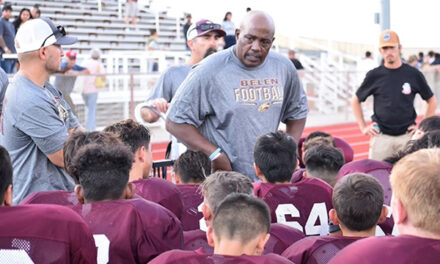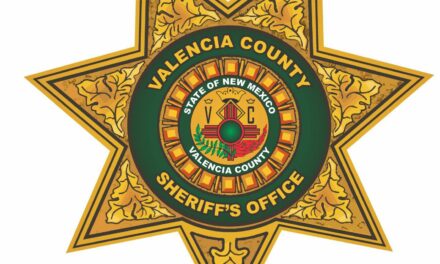ISLETA — The name Miguel H. Trujillo probably isn’t well known to many New Mexicans, but his contribution to Native voting rights in the state and across the nation are immeasurable.
After returning from serving in World War II, Trujillo decided it was time to be a registered voter and help shape the country he had defended. The Marine veteran traveled to the Valencia County clerk’s office, where then Clerk Eloy Garley told him he wasn’t allowed to register.
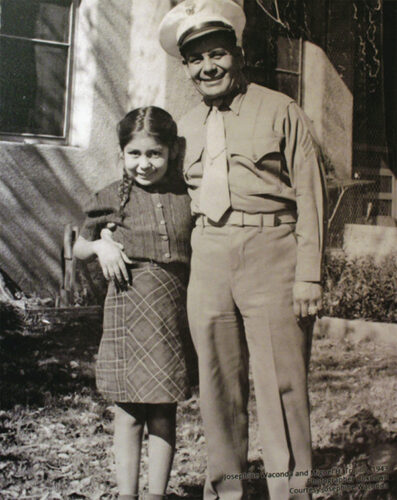
Photo courtesy of Josephina Waconda
Isleta Pueblo member Miguel H. Trujillo, right, poses for a photo with his daughter, Josephina Waconda, in 1943, five years before he brought the landmark lawsuit which gave Native Americans in New Mexico the right to vote.
Trujillo, a member of the Isleta Pueblo, who along with the majority of New Mexico Natives, was considered an “Indians not taxed” by the state’s constitution and was prohibited from voting. So, Trujillo took the county to court, challenging that just because he didn’t pay property taxes on Pueblo lands he lived on, didn’t mean he should be disenfranchised.
On Aug. 3, 1948, a panel of three federal judges agreed, and 24 years after being granted citizenship, Natives in New Mexico were given the right to vote.
Over the years, the Pueblo of Isleta Veterans Association had held small celebrations, honoring Trujillo as a veteran and voting rights advocate, but he hadn’t really been showcased, said Pueblo of Isleta Gov. Vernon Abeita.
Earlier this year, Abeita and other pueblo officials connected with the New Mexico Humanities Council, which offered a grant to put together a celebration of Trujillo.
“We planned this in about six weeks,” Abeita said with a laugh. “It was a lot of stress but a successful event.”
On Wednesday, Aug. 3, Pueblo members and speakers gathered to honor and celebrate the monumental court decision that was Trujillo vs. Garley at the inaugural Miguel Trujillo Day. Abeita said the Pueblo plans to make this an annual event.
“We want to have people talk about Miguel and to continuously have our Native people understand where our voting rights came from,” the governor said. “Myself, I didn’t know. Just because I was a New Mexican or an American, I thought that gave me (voting) rights. Not so. This is kind of where it all started.”
Pat Abeita, granddaughter of Trujillo, said she wasn’t sure if he really understood the impact his actions had because no one acknowledged him.
“No one acknowledged what he did. So when this happened and here we are today, how many years later celebrating what he did, I can’t imagine how many sacrifices he made just to reach that point,” Pat Abeita said.
She called her grandfather a kind, simple, good-hearted man, who emphasized the importance of education to his family as well as serving the community.
“We’ve all chosen service careers to help on another, to help our people,” she said. “I just encourage all of you to recognize the importance of voting, and what it means to our people. With our voice and our vote, we can make a difference, not only here locally, but on the state and national level.
“It’s hard to think of my grandfather as (a civil rights leader) but hearing people talk about him and hearing the history of him, he was and we take pride and hopefully carrying on his legacy.”
When his grandchildren were old enough to vote, Trujillo made sure they were educated voters, said his granddaughter, Karen Waconda.
“He educated me on how to read a ballot. He went with all of us to go learn how to vote,” Waconda said. “We had to do the research, look at newspaper clippings. Who is this person we’re voting for? What do they stand for?”
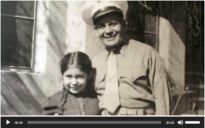
Click the image above to listen to the July 28 Native America Calling podcast about Miguel Trujillo’s legacy. His granddaughter, Pat Abeita, and Janice Lucero, member of the Isleta Pueblo Voters Alliance, were guests.
Mandy Hill, New Mexico state election director, delivered remarks on behalf of New Mexico Secretary of State Maggie Toulouse Oliver.
“The legacy of Mr. Trujillo is one of dignity, sacrifice and unwavering dedication to furthering the civil rights of Native Americans,” Hill said.
She also announced during the 2022 National Association of Secretaries of State Conference, Toulouse Oliver submitted Trujillo for the Margaret Chase Smith American Democracy Award, and Trujillo, who died in 1989, was selected to be this year’s recipient. The award will be presented at the NASS 2023 Winter Conference in Washington, D.C.
Eric Chavez, the field representative for the Office of U.S. Sen. Ben R. Lujan, said Trujillo’s “triumphant win continues to be celebrated across the state and the nation. And today, on Miguel Trujillo Day, we celebrate the hard fought right to vote for Native Americans in New Mexico but also the work of voting rights activists who are fighting tirelessly to secure equal access to the ballot.”
While New Mexico has come a long way and opened doors for Native voters in the state, Native voters still face inequitable access to the ballot, Chavez said. In the last decade, Native American and Alaska Native populations have increased from 5.2 million in 2010 to 9.7 million in 2020, now representing 2.9 percent of the U.S. population.
“But 34 percent of eligible, Native American voters are not registered to vote. This is 1.2 million eligible voters,” he said. “What’s more, the turnout rate among Native voters is nearly 10 percentage points lower than the rate of other ethnic groups.
“Native Americans simply should not have to work as hard as they do now to exercise their basic right to vote. Today, many Native voters have to travel over 100 miles to reach their nearest elections office, or voter registration site. Casting your vote and making your voice heard should not be that difficult.”
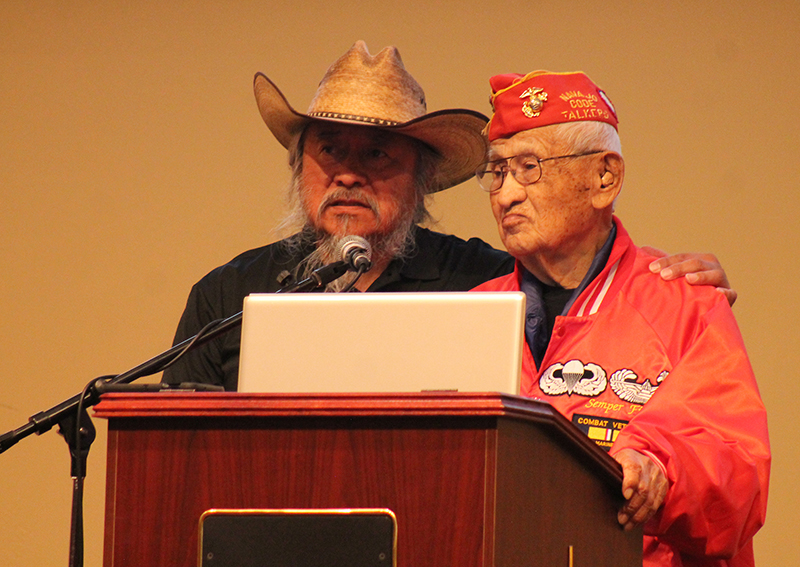
Julia M. Dendinger | News-Bulletin photo
Among those who spoke and honored the late Miguel Trujillo last week, a civil rights activist from Isleta Pueblo, were R.C. Begay and his father, Thomas Begay, a World War III Navajo Code Talker, who Trujillo recruited to serve in the U.S. Marine Corps.
In 2018, Sen. Lujan introduced the Native American Voting Rights Act, which in 2021 was renamed the Frank Harrison, Elizabeth Peratrovich and Miguel Trujillo Native American Voting Rights Act of 2021 to honor Trujillo’s legacy.
Janice Lucero, a member of the Isleta Pueblo Voters Alliance, a grass roots, nonprofit organization founded in 2020, said the focus of the organization is to focus on bringing collective changes through voting.
The pueblo holds its own tribal elections every two years and, in 2020, the negative sentiments permeating the national political landscape were felt on the Pueblo.
“They weren’t necessarily focusing on the community and a lot of political agendas were at the forefront,” Lucero said. “We started asking, how do we rebalance our community into truly what we are. That really sparked a movement.”
Kicked off during COVID, IPVA had to get creative in how it did outreach and relied heavily on Zoom, Lucero said, holding Coffee with a Candidate events that year.
“We did a lot of surveying and community organizing, got a lot of community members involved and voices heard,” she said. “Unfortunately, registration and day of (voting), we were not as successful.”
Isleta voters face several hurdles, Lucero said, including having to register to vote every two years.
“Another barrier we have found is that registration is only on a certain weekend and it seemed like that weekend was the one when (a lot of people) were out hunting, so that really affected numbers,” she said. “Another issue is access. There’s only one place to vote.”
Outside of pueblo or tribal elections, Native populations often don’t have a lot of information.
“Campaigning doesn’t really come into tribal communities. I’ve seen mailings but I don’t see door-to-door (campaigning),” she said. “I don’t see candidates advocating in these types of rural communities, talking about the changes they want to make and the help they can give us. I don’t see them establishing those relationships.”
Lucero would like to see candidates work more to get information to Native voters, to build awareness and boost participation.
“Not a lot of Native folk go out to vote because they are not aware; they don’t relate to who is running or they don’t know who is running,” she said. “We do have a voting location (for state and local elections) in Isleta but I would like to see more.
“The one thing I will say, is exercise your right to vote. It’s your constitutional right. Your voice, your future.”
The IPVA can be found on both Facebook and Instagram and be reached by email, [email protected].
Julia M. Dendinger began working at the VCNB in 2006. She covers Valencia County government, Belen Consolidated Schools and the village of Bosque Farms. She is a member of the Society of Professional Journalists Rio Grande chapter’s board of directors.


